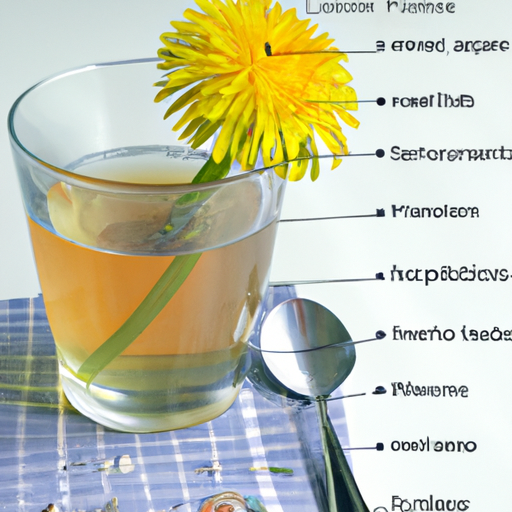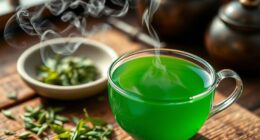Imagine yourself transported to ancient India, where turmeric has long been revered for its healing properties. Even today, turmeric remains a staple in Ayurvedic and Chinese medicine. An easy way to enjoy the benefits of this potent spice is by sipping on turmeric tea.
Turmeric tea is a flavorful and easy way to enjoy the many health benefits of turmeric. This bright yellow spice is known for its anti-inflammatory properties, which are linked to a range of health benefits, including improved digestion, reduced risk of chronic disease, and even potential cancer-fighting properties.
In this article, we’ll explore the science behind turmeric tea and its many benefits for your health and well-being.
Key Takeaways
- Turmeric tea contains curcumin, a compound that has anti-inflammatory properties and can improve digestion.
- Drinking turmeric tea may help reduce the risk of heart disease and potentially prevent cancer, though more research is needed in this area.
- Turmeric tea can be customized with other ingredients like ginger or cinnamon, and can be enjoyed as a healthy alternative to coffee or as a relaxing bedtime drink.
- Turmeric tea can promote gut health, stimulate bile production, and enhance immune function by promoting the growth of beneficial bacteria and increasing the production of immune cells. However, it should be used with caution in individuals taking blood-thinning medication or with bleeding disorders.
The History of Turmeric’s Medicinal Use
You may be surprised to learn that turmeric has been used for its medicinal properties for thousands of years. It dates back to ancient Ayurvedic practices in India. Turmeric’s medicinal use has a rich historical perspective and cultural significance. Traditional healers have used it to treat a variety of ailments, from digestive issues to skin conditions. In fact, Ayurvedic medicine still incorporates turmeric as a key component in many of its treatments today.
Turmeric also has a place in traditional Chinese medicine and is a popular spice in many Middle Eastern and Southeast Asian cuisines. Its use as a medicinal herb has spread to other parts of the world. Modern research continues to uncover its potential health benefits.
Now, let’s explore how turmeric is consumed in the form of tea and its benefits.
What is Turmeric Tea?
As you take a sip of this warming beverage known as the ‘golden elixir,’ you can feel the comforting effects of the ancient spice that’s been used for centuries in Ayurvedic medicine.
Turmeric tea is a warm, soothing drink made by steeping ground turmeric root in hot water. It has a slightly bitter taste with a hint of earthiness.
To prepare turmeric tea, start by boiling water in a pot or kettle. Add one teaspoon of ground turmeric to a mug and pour the hot water over it. Let it steep for 5-10 minutes before enjoying.
You can also add other ingredients such as honey, lemon, ginger, or cinnamon to enhance the flavor and health benefits. Turmeric tea is an easy way to incorporate the healing properties of turmeric into your daily routine.
As you learn more about turmeric tea, it’s important to understand the active ingredient in turmeric: curcumin. This compound is responsible for many of the health benefits associated with turmeric, including its anti-inflammatory and antioxidant properties.
The Active Ingredient in Turmeric: Curcumin
When sipping on a warm cup of turmeric tea, the powerful compound responsible for its healing properties is curcumin, adding a golden hue and earthy flavor to your beverage.
Curcumin is a natural anti-inflammatory and antioxidant, which can help reduce inflammation in the body and protect against oxidative damage caused by free radicals.
Its benefits don’t stop there, as curcumin has been shown to improve brain function, lower the risk of heart disease, and even potentially prevent cancer.
While turmeric tea is a great way to incorporate curcumin into your diet, some may opt for curcumin supplements to achieve higher doses. However, it’s important to note that supplement quality and dosage can vary greatly, so it’s best to consult with a healthcare professional before adding any supplements to your regimen.
With the powerful benefits of curcumin, it’s no wonder turmeric tea has become a popular beverage for both its taste and health benefits. Transitioning into the subsequent section about the anti-inflammatory properties of turmeric tea, it’s important to note that the benefits of curcumin in turmeric tea extend beyond just its anti-inflammatory properties.
Anti-Inflammatory Properties of Turmeric Tea
If you’re looking for a natural way to reduce inflammation in your body, consider incorporating turmeric tea into your daily routine. Turmeric contains a compound called curcumin, which has been shown to have potent anti-inflammatory effects. In fact, some studies suggest that curcumin may be as effective as certain anti-inflammatory drugs in reducing inflammation in the body.
To make turmeric tea, you can simply add a teaspoon of turmeric powder to a cup of hot water and let it steep for a few minutes. You can also add other ingredients like ginger, honey, or lemon to enhance the flavor and health benefits of the tea.
The best time to drink turmeric tea is in the morning or before bed, as these are times when your body can absorb the nutrients more effectively. So, if you’re looking for a natural way to combat inflammation in your body, give turmeric tea a try and see how it can benefit you.
It’s important to note that reducing inflammation in the body can also have positive effects on the digestive system. So, let’s explore how turmeric tea can help improve your digestion.
Digestive Benefits of Turmeric Tea
If you’re looking to improve your digestive health, turmeric tea might be just what you need. This drink is known for easing symptoms of irritable bowel syndrome, such as bloating, cramping, and diarrhea, thanks to its anti-inflammatory properties.
In addition, turmeric tea can promote healthy digestion overall, helping your body break down food more efficiently and absorb essential nutrients. So if you want to give your gut some extra love, consider adding turmeric tea to your daily routine.
Easing Symptoms of Irritable Bowel Syndrome
You’ll be glad to know that turmeric tea can help ease the uncomfortable symptoms of irritable bowel syndrome (IBS). This natural remedy has been shown to reduce inflammation in the gut, which can alleviate abdominal pain, diarrhea, and constipation associated with IBS. Turmeric contains a compound called curcumin, which has anti-inflammatory properties and acts as a natural pain reliever.
By drinking turmeric tea regularly, you can manage your IBS symptoms and improve your overall digestive health. In addition to easing IBS symptoms, turmeric tea has other benefits for promoting healthy digestion. For example, it can stimulate the production of bile, which helps break down fats and aids in the absorption of nutrients.
Turmeric tea can also improve gut health by promoting the growth of beneficial bacteria in the gut. This can help prevent the development of digestive disorders such as leaky gut syndrome and ulcerative colitis. So, if you want to maintain a healthy digestive system, incorporating turmeric tea into your daily routine is a great idea.
Promoting Healthy Digestion
To keep your digestive system running smoothly, it’s important to incorporate a daily routine that promotes healthy digestion and encourages the growth of beneficial gut bacteria. Turmeric tea is a great addition to your routine as it contains curcumin, a compound that has been shown to improve digestion and reduce inflammation in the gut.
Here are some recipes and best brands to try:
- Recipes: Turmeric Ginger Tea Recipe, Golden Milk Recipe, Turmeric Latte Recipe
- Best Brands: Pukka Herbs Organic Turmeric Gold Tea, Traditional Medicinals Organic Turmeric with Meadowsweet & Ginger Tea, Numi Organic Tea Turmeric Amber Sun
Incorporating turmeric tea into your daily routine can help support a healthy digestive system.
Now, let’s explore its immune-boosting properties.
Immune-Boosting Properties
Boost your immune system with turmeric tea! It contains immune-boosting benefits that enhance the function of immune cells in the body. Curcumin, the main active ingredient in turmeric, has powerful anti-inflammatory and antioxidant properties that support the immune system and protect against disease. Studies have shown that curcumin can increase the production of immune cells in the body, helping to fight off harmful pathogens and infections.
In addition to its immune-boosting benefits, turmeric tea has numerous other health benefits. It’s been shown to improve brain function, lower the risk of heart disease, and even reduce the symptoms of depression. Turmeric tea has also been studied for its potential cancer-fighting properties. Curcumin has been shown to inhibit the growth of cancer cells and induce apoptosis, or cell death, in cancer cells.
Potential Cancer-Fighting Properties
If you’re looking for a natural way to potentially fight cancer, consider incorporating turmeric into your diet through its active ingredient, curcumin. Research findings suggest that curcumin may have anti-cancer properties and can potentially prevent the growth and spread of cancer cells.
Studies have shown that curcumin can inhibit the growth of various types of cancer cells, including breast, lung, and prostate cancer. In addition to inhibiting the growth of cancer cells, curcumin may also reduce inflammation and oxidative stress, which are known to contribute to the development of cancer.
While more research is needed to fully understand the anti-cancer properties of curcumin, incorporating turmeric into your diet can potentially provide numerous benefits for cancer prevention.
Next, we will explore the heart-healthy benefits of turmeric tea.
Heart-Healthy Benefits
Healthy hearts can be helped by regularly sipping on a steaming cup of turmeric-infused tea. According to nutrition research, turmeric has anti-inflammatory properties that may help reduce the risk of heart disease. Inflammation can cause damage to the blood vessels and increase the risk of heart attack or stroke. By reducing inflammation, turmeric can help keep your heart healthy and strong.
Additionally, incorporating turmeric tea into your daily routine can be a healthy addition to your exercise routine. Exercise is important for maintaining heart health, but it can also cause inflammation and oxidative stress. Studies have shown that turmeric can help reduce these negative effects of exercise, allowing for better overall heart health. So, next time you lace up your sneakers, don’t forget to make yourself a cup of turmeric tea to further support your heart health.
While turmeric tea has many potential benefits, it’s important to be aware of any potential side effects and precautions.
Potential Side Effects and Precautions
While turmeric tea has numerous health benefits, it’s important to be aware of potential side effects and precautions. Although turmeric is generally safe, it may cause stomach upset, dizziness, or diarrhea in some individuals.
High doses of turmeric may interact with certain medications, such as blood thinners or diabetes medications. Therefore, it’s important to speak with your healthcare provider before incorporating turmeric supplements into your daily routine.
If you do experience side effects from turmeric tea, there are ways to manage them. For example, you may want to start with a lower dosage and gradually increase it over time. You can also try taking turmeric supplements with food to help reduce stomach upset.
Additionally, if you’re taking medication, it may be helpful to space out the timing of your turmeric consumption to avoid any potential interactions. By being mindful of these precautions and side effects, you can safely incorporate turmeric tea into your diet and reap its numerous health benefits.
Incorporating Turmeric Tea into Your Diet
To add some variety to your daily drinks, try incorporating turmeric tea into your diet. You can brew it with some warm almond milk and honey for a soothing and comforting beverage. Turmeric tea recipes are easy to make and can be customized to your liking. You can add ginger, cinnamon, or even black pepper to enhance the flavor and health benefits.
But when’s the best time to drink turmeric tea? Some people prefer to drink it in the morning as a healthy alternative to coffee, while others enjoy it in the evening as a relaxing bedtime drink. It’s also great to drink after a meal to aid in digestion and reduce inflammation. However, it’s important to note that turmeric has a slight blood-thinning effect, so it’s best to avoid drinking it if you’re on blood-thinning medication or have a bleeding disorder.
Overall, incorporating turmeric tea into your diet can provide numerous health benefits and can be a delicious addition to your daily routine.
Frequently Asked Questions
How much turmeric tea should I drink to experience its health benefits?
Sipping on a soothing cup of turmeric tea can be beneficial, but moderation is key. Drinking too much can lead to digestive issues and potential liver damage. Stick to one to two cups a day for optimal health benefits.
Can turmeric tea help with weight loss?
Turmeric tea can aid in weight loss by boosting metabolism and reducing inflammation. The benefits of turmeric tea include its anti-inflammatory properties and ability to regulate blood sugar levels, making it a healthy addition to any diet.
Is it safe to consume turmeric tea during pregnancy?
If you’re pregnant, it’s important to consider pregnancy safety when consuming turmeric tea. While it offers numerous health benefits, including anti-inflammatory properties, studies suggest limiting consumption during pregnancy to culinary amounts. Consult with your healthcare provider for guidance.
Can turmeric tea interact with certain medications?
Hey there! Before you indulge in turmeric tea, be mindful of potential interactions with medications. Consult with your healthcare provider and take necessary precautions to avoid any adverse effects.
Are there any differences between using fresh turmeric root versus powdered turmeric in tea?
When making turmeric tea, fresh turmeric root may yield a stronger flavor and more health benefits than powdered turmeric. Experiment with different recipes, such as adding ginger and honey, for the best tasting and most beneficial turmeric tea.
Conclusion
So, you’ve heard about the numerous health benefits of turmeric tea, and now you’re curious about incorporating it into your daily routine. Well, you’ll be happy to know that it’s easy and enjoyable to do so!
Imagine starting each day with a warm cup of turmeric tea. As you sip it, you can feel the anti-inflammatory properties soothing your body and the digestive benefits aiding in your overall health. Plus, you can feel confident in its potential cancer-fighting properties and heart-healthy benefits.
Turmeric tea can be made from scratch with fresh turmeric root or purchased in tea bags for convenience. Whether you drink it alone or add it to your favorite beverage, it’s a delicious way to promote overall wellness.
So, why not add this golden elixir to your daily routine and experience all the amazing benefits it has to offer?










